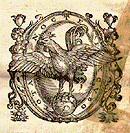
1568, Venice: PIETRO DA FINO
The author of the last commentary on the Comedy to be published during
the 16th century, Bernardino Daniello (the
Dante commentary tradition), was born in Lucca around 1500 and died
in Padua in 1565. Consequently, this edition appeared posthumously, having
been brought out in 1568 by an obscure editor, Pietro da Fino, who dedicated
the book to his relative and patron, Giovanni da Fino. Only about ten editions,
including this single Dante, have been attributed to da Fino, active in
Venice between 1555 and 1576. His device was a rooster atop the globe with
the motto "Tota nocte excubo" (I keep watch throughout the night).
Like Vellutello before him, Daniello had previously written a commentary
on Petrarch (1541, revised, 1549) before tackling Dante. He was probably
stimulated to undertake a Dante commentary by the appearance of Vellutello's
Dante in 1544, a commentary at odds with Pietro Bembo and his school. Daniello
published a revised version of his Petrarch in 1549, but by 1547 he was
at work on Dante. The work must have proved rough going since he was unable
to finish and publish it within the almost twenty years remaining in his
life.
Daniello was initiated into the literary scene during the third decade of
the century, at the school of Trifone Gabriele (ca. 1470-1549), a contemporary
and disciple of Pietro Bembo. He learned from their school the principles
of the new literature and poetics which dominated the period. Thus it is
not surprising to find Daniello observing that "our divine poet Dante"
was "a greater and more perfect philosopher than poet," and that
he often wrote obscurely, abused new and foreign words, and forced rhymes.
Petrarch was clearly a preferable model. Still, Daniello's commentary reveals
a much greater appreciation of Dante's poetry than one would have expected
from a Bembian Petrarchist. Here the influence of Trifone Gabriele shows
most vividly: Gabriele, more open than Pietro Bembo to Dante's poetry had
himself composed extensive Annotazioni (Annotations) to the poem
which had remained unpublished. Daniello borrowed many passages from these
annotations for his own commentary. Some scholars believe that the best
and most original parts of Daniello's commentary derive from Gabriele (a
modern edition of whose work is forthcoming). If Daniello himself had lived
to publish his commentary, no doubt he would have acknowledged his debt
to Trifone Gabriele, as he had done in his earlier Petrarch commentary.
Daniello's primarily rhetorical preoccupations were out of phase by the
second half of the 16th century, the age of Tasso's Gerusalemme liberata,
when literary culture turned ever more insistently to the heroic and the
tragic, and also returned to Dante by way of interest in Aristotilean poetics
and Homeric poetry. Daniello, though, had little more to offer than a literal
interpretation of the text, masking with prolix and gray periphrasis his
disinterest in the historical-political and theological-philosophical content
of the poem.

